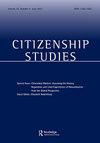说话的公民:语言要求与语言新自由主义殖民主义
IF 1.9
3区 社会学
Q3 POLITICAL SCIENCE
引用次数: 2
摘要
摘要本文关注的是西欧国家普遍存在的围绕语言、融合和公民身份的当代常识政治,在这些国家,语言是一种新的公民身份模式——语言权的基础。我认为语言权是两种看似不同的逻辑的产物:新自由主义的逻辑和殖民主义的逻辑(以及遗产)。我认为,语言法掩盖了一个事实,即“民族语言”是一个植根于帝国主义的历史构建的类别,并允许其他类别的消失,如白人和中产阶级。本章展示了一种“地方化民族语言”是如何产生的,一方面是当今全球使用多种语言的必然性,另一方面是一个国家坚持使用一种语言。本文对语言权的分析迫使人们对公民身份有了新的理解,即通过语言、种族和阶级的交叉不平等,看到制度和听到制度在公民身份和公民的定义中结合在一起。本文章由计算机程序翻译,如有差异,请以英文原文为准。
The speaking citizen: language requirements and linguistic neoliberal colonialisms
ABSTRACT This article concerns contemporary common-sense politics around language, integration, and citizenship that pervade Western European countries, where language is at the basis of a new model of citizenship – jus linguarum. I situate jus linguarum as the product of two seemingly different logics: the logics of neoliberalism and the logics (and legacies) of colonialism. I argue that jus linguarum obscures the fact that ‘national language’ is a historically constructed category with roots in imperialism, and allows for the disappearance of other categories, such as whiteness and middle-classness. The chapter shows how a form of ‘provincialised national languages’ arise from the tensions between the inevitability of multilingualism in today’s global world, on the one hand, and the insistence of one-nation-one-language, on the other. The analysis of jus linguarum developed in this paper forces a new understanding of citizenship where regimes of seeing and regimes of hearing combine in definitions of citizenship and citizens, through intersecting inequalities of language, race, and class.
求助全文
通过发布文献求助,成功后即可免费获取论文全文。
去求助
来源期刊

Citizenship Studies
POLITICAL SCIENCE-
CiteScore
3.60
自引率
11.10%
发文量
85
期刊介绍:
Citizenship Studies publishes internationally recognised scholarly work on contemporary issues in citizenship, human rights and democratic processes from an interdisciplinary perspective covering the fields of politics, sociology, history and cultural studies. It seeks to lead an international debate on the academic analysis of citizenship, and also aims to cross the division between internal and academic and external public debate. The journal focuses on debates that move beyond conventional notions of citizenship, and treats citizenship as a strategic concept that is central in the analysis of identity, participation, empowerment, human rights and the public interest.
 求助内容:
求助内容: 应助结果提醒方式:
应助结果提醒方式:


